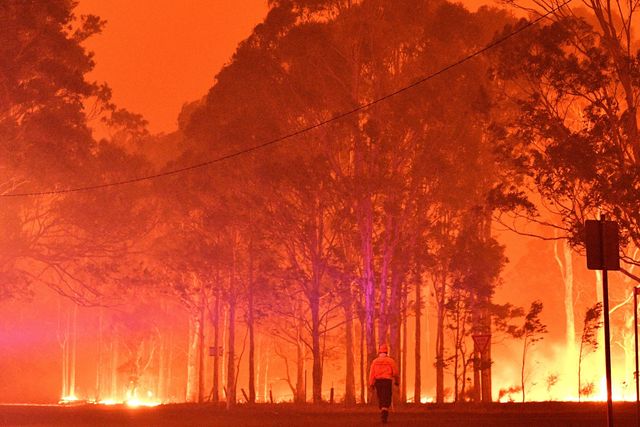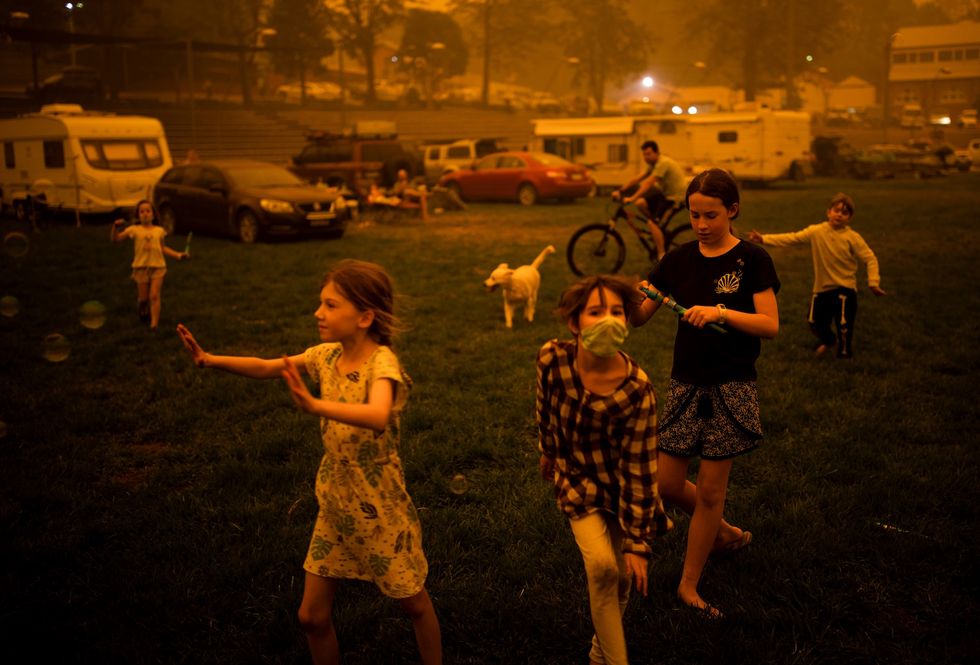Someday we will realize as a species that we are living on a particularly hospitable rock in a galactic backwater and it's the only planet we've got. We are not going to Mars. Fuck off with the Mars stuff. Maybe like eight people will go to Mars. When exactly does Elon Musk—or any of the other rocket-fixated billionaire narcissists who should be taxed—think we'll be able to move enough people to another planet to abandon this one? Are the 7 billion people who will be stuck here even a concern? Or are they just casualties to the rapacious consumption of the relative few, among whom an even smaller group will be chosen to keep the human race alive on another space rock where you can't breathe the air?
Hopefully this revelation will occur sometime in the next decade, because it did not come along in the one that ends today. What else, besides the same titanic human hubris that leads many to assume we are alone in the universe, allows us to ignore the mounting signs that our very hospitable planet is becoming increasingly less hospitable? Australia is beginning the new year on fire. This follows yet another year in which California saw catastrophic wildfires, and so did Europe, and so did...the Arctic. That's where there were also some heat waves—in the Arctic—and where this summer saw extreme and rapid ice melt. In Greenland, where the ice is now melting seven times faster than in the 1990s, we were treated to video of melted glacier water that became something approaching whitewater rapids.
In climatically boring New York, one of the world's largest cities got an advance trailer of the climate crisis movie across two days: a searing heat wave that led to partial blackouts due to soaring energy demand, followed immediately by a biblical thunderstorm that at one point dropped three inches of rain an hour on Brooklyn. This easily overwhelmed the city's sewage systems and left drastic flooding. Climate and adaptation experts told me this is what summer in the city will soon look like on a regular basis. In this and everything else, they tend to be conservative in their public messaging, wary of getting out over their skis. But what they're willing to say is only getting more dire. In general, things seem to be happening faster than we thought—and that's before the feedback loops have kicked in.
We can anticipate stronger storms in general, including hurricanes, which will boast higher winds and drop more water thanks to warming ocean temperatures. Hurricane Harvey dropped 33 trillion gallons of water on Houston and beyond. Another of the world's great cities, Hong Kong, saw a typhoon towards the end of last year that demonstrated the raw power of nature and its capacity to wreak havoc on even the most advanced urban infrastructure. The videos from residents were haunting, as the ferocious winds played on skyscraper windows to form a soundtrack for the end times.
The American Midwest saw massive flooding that destroyed crop yields and, in many cases, farmers' livelihoods. Increasingly, the great rivers of the American heartland seem eager to swell until they swallow up the surrounding area. Like everything else here, these massive flooding events are not unprecedented, but their ferocity seems to be growing, and they seem to be an annual staple these days.
Meanwhile, parts of the American Southwest seem to be moving from prolonged drought to what scientists have taken to calling "aridification." That's the term for a formerly fruitful area that has become a desert. These rapid changes have led four states to wage a prolonged battle over control of the Colorado River, a peaceable preview of Water Wars to come. When parts of the developing world face the same water-access challenges—like, say, in northern India—it may be difficult to resolve amicably. And that's before climate refugees from areas where it no longer rains—like, say, western Honduras—move into town and put further strain on local resources. Some of the folks in The Caravan about which we had a national meltdown are early climate migrants. How do you feel about our capacity to deal with this on a mass scale—like out of Bangladesh, a nation of 100 million people, large swathes of which are at or near sea level?
Amid all this, we've learned that the world's carbon emissions are up for the third straight year. We're supposed to cut them in half by 2030. It probably did not help that the American government is working overtime to roll back any and all attempts to cut emissions while the president travels the country screaming that windmills cause cancer. The opposition party's most powerful figure dismissed a plan to remake the economy to address this crisis on the scale required as "the green dream, or whatever they call it." But there is no denying either that China has reversed course on developing clean energy, and that rapidly emerging markets in India will be hard-pressed to stop burning coal. It's a difficult moral argument for the West to make when our own insatiable thirst for dirty energy has fueled so much of this mess, and when we are doing so little ourselves despite all our wealth and our power.
It now looks close to impossible for the human race to keep global temperature rise below 1.5 degrees Celsius, the point at which scientists tell us we will begin to see truly grave disruptions to ecology and environment. After all, we are only just beginning to see the ramifications of what we have wrought in our beautiful world, where scientists believe the sixth mass extinction event in the planet's history has already begun. This is the Anthropocene, the slice of Earth's 4 billion years that has been shaped, overwhelmingly, by its most enterprising and destructive species. It's a near-incomprehensibly tiny epoch in the scheme of things, and we are determined, seemingly, to ensure it does not grow much larger.
It is hard now to avoid the feeling that the ship is sinking. We've already tossed Miami Beach overboard. There is no second ship to escape to—only the lifeboats our billionaire overlords dream of building, which will only ever have space for the few. Rich guys get on first, whether it's the rocket ship to Mars or the bunker in New Zealand or the platform city in the Pacific. Time will tell if they can spare themselves from the journey into the deep and dark that awaits the rest of us in this new decade and beyond. The way we're headed, the argument that we've never met another advanced civilization because they tend to destroy themselves before it could happen looks stronger by the day. We're only about 200,000 years old. The planet was here before, and it will be here after, and perhaps we will go down as a minor disturbance. It will not feel very minor to us, though. Happy New Year.
Jack Holmes is a senior staff writer at Esquire, where he covers politics and sports. He also hosts Unapocalypse, a show about solutions to the climate crisis.














